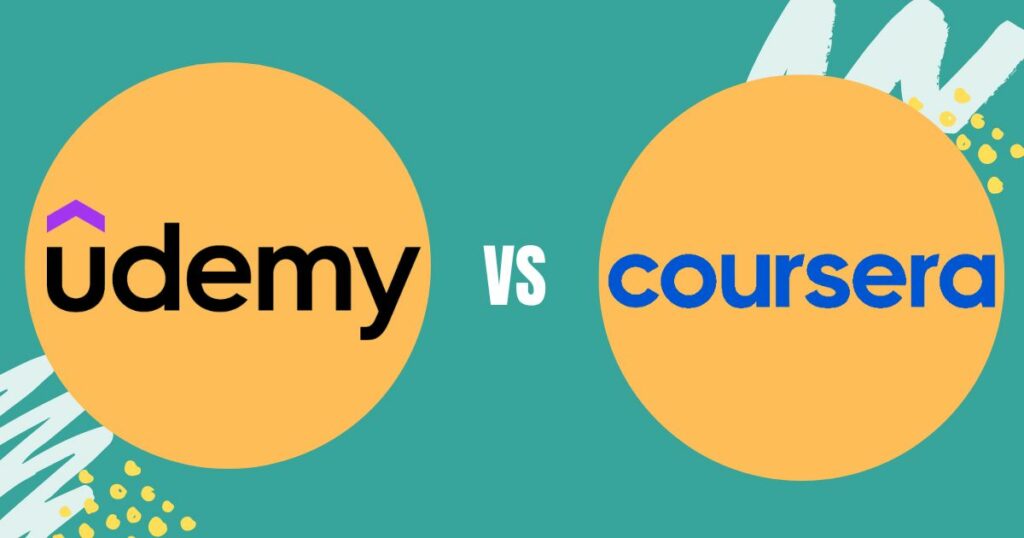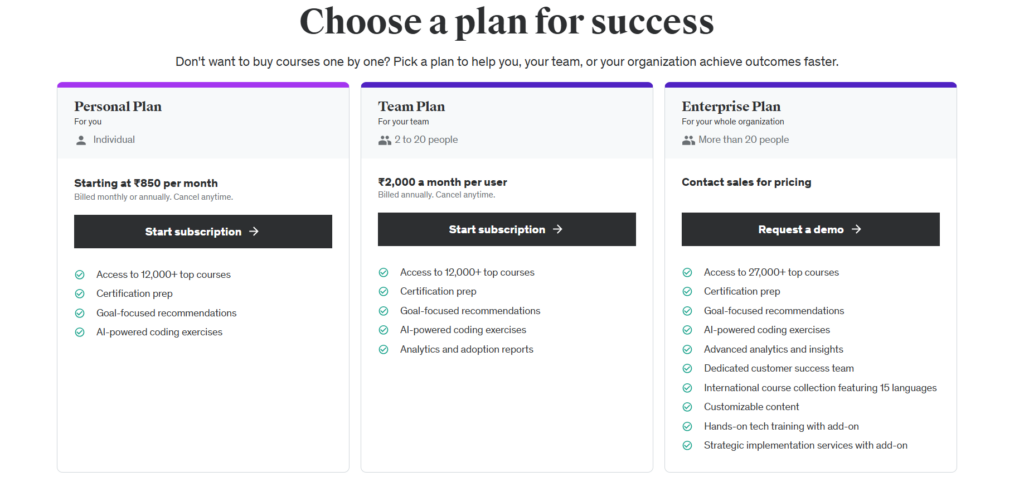I’ve often found myself looking for ways to learn something new—whether for work, personal growth, or just for fun. That’s when I came across Udemy and Coursera, two of the most popular online learning platforms out there.
At first glance, they seem pretty similar: tons of courses, expert instructors, and the promise of gaining valuable skills.
But when I dug deeper, I realized they have some key differences that can make one better than the other depending on your needs.
So, if you’re trying to decide between Udemy and Coursera, don’t worry—I’ve broken it all down for you. From pricing to course quality, certificates, and overall value, this comparison will help you figure out which one suits you best. Let’s dive in!
Udemy
Udemy is a global online learning platform offering courses across diverse fields like technology, business, design, and personal development.

It connects learners with expert instructors through an extensive library of on-demand video courses. Designed for flexibility, Udemy allows users to learn at their own pace, anytime, and anywhere.
Its offerings range from beginner to advanced levels, catering to professionals seeking career advancement, students supplementing their education, or individuals pursuing hobbies. Instructors can monetize their expertise by creating and selling courses.
With affordable pricing, frequent discounts, and a community-driven approach, Udemy democratizes education and empowers individuals worldwide to acquire new skills.
Coursera
Coursera is an online learning platform offering courses, specializations, and degrees across various fields, in partnership with top universities and organizations.

It provides flexible, accessible education in subjects like business, technology, health, and humanities. Learners can choose from free or paid courses, many of which are taught by university professors and industry experts.
Coursera’s offerings include certifications, professional development programs, and fully accredited degrees.
The platform aims to make high-quality education accessible to learners worldwide, helping them build skills, earn credentials, and advance their careers. It also features interactive elements like quizzes and peer assessments.
Key Features Comparison: Udemy vs Coursera
Here is a detailed comparison table of Udemy and Coursera based on key features, followed by reasons why Udemy might be considered better in certain scenarios:

| Feature | Udemy | Coursera |
|---|---|---|
| Course Type | Individual, self-paced courses | University-backed courses, Specializations, Degrees |
| Pricing Model | Pay per course (frequent discounts) | Subscription (Coursera Plus), free audit available, or degree pricing |
| Course Cost | Affordable; most courses are $10-$30 | Higher cost for certificates and degrees |
| Content Ownership | Lifetime access to purchased courses | Access only during subscription or enrollment period |
| Instructors | Industry professionals & independent instructors | Professors and professionals from top universities |
| Course Availability | Extensive range; anyone can create a course | Limited to vetted universities and organizations |
| Flexibility | Highly flexible, start anytime | Structured with specific start dates for many courses |
| Learning Style | Video-centric, practical, hands-on | Academic-oriented, includes assignments and graded quizzes |
| Certification | Certificate of completion | Verified, accredited certificates and degrees |
| Course Categories | Diverse (tech, business, hobbies, etc.) | Academic fields, professional skills |
| Free Content | Some free courses | Many courses are free to audit without certificates |
| User Base | Over 60 million learners | 100+ million learners |
| Skill Focus | Practical and job-ready skills | Academic and professional development |
Why Udemy is Better in Some Cases:
Udemy is better suited for learners looking for affordable, flexible, practical, and diverse courses with lifetime access.
While Coursera is excellent for structured learning, accredited certificates, and academic-level courses, Udemy stands out for skill-based and hobby-focused learners who value flexibility and low-cost education.
Pricing Comparison: Udemy vs Coursera
Here is a Pricing Comparison between Udemy and Coursera, along with reasons why Udemy can be considered better for affordability and flexibility.
Udemy Pricing

1. Pay-Per-Course Model:
- Courses are individually priced, typically ranging from $10 to $30 during sales (frequent discounts).
- Standard pricing for most courses without discounts is between $50 and $200.
- Lifetime Access: Once purchased, you own the course forever, with no recurring fees.
2. Free Courses:
- Offers a selection of free courses in various categories.
3. No Subscription Commitment:
- No monthly or annual payments required unless choosing optional course bundles or Udemy Business.
Coursera Pricing
Coursera offers a wide range of courses across various subjects, including degrees, specializations, and individual courses. Their pricing is more varied due to the broad spectrum of content they provide.
1. Individual Courses:
- Cost: Typically ranges from $29 to $99 per course.
- Some individual courses can be accessed for free (audit option), but the certificate and access to assignments typically cost $29 to $49 per month for most courses.
- Example: A course on financial management or Excel for business might cost around $49 to $99.
2. Specializations:
- Cost: A Coursera Specialization (a series of related courses) typically costs around $39 to $79 per month.
- Example: A financial accounting specialization could take several months to complete, with the price being based on the monthly subscription fee.
3. Professional Certificates:
- Cost: Professional certificates on Coursera generally range from $39 to $79 per month, depending on the program and duration. These programs typically offer certifications that are designed to help learners gain skills for specific careers.
- Examples: Google IT Support or IBM Data Science programs cost about $39 per month.
4. Degree Programs:
- Cost: Coursera offers full online degrees in partnership with universities, such as bachelor’s or master’s degrees.
- Example:
- Master’s Degrees typically range from $15,000 to $40,000 depending on the university and program.
- Bachelor’s Degrees are more expensive and can cost anywhere from $10,000 to $25,000.
- These degree programs are accredited by universities and can take from 1 to 3 years to complete.
5. Coursera Plus Subscription:
- Cost: Coursera offers a subscription plan called Coursera Plus, which provides access to over 7,000 courses for a flat fee of $399 per year.
- With Coursera Plus, you get access to many courses across various subjects and can earn certificates on most courses within the subscription.
6. Free Audits:
Many Coursera courses are available for free if you choose the audit option, where you can access video lectures and some materials but will not receive a certificate. If you want a certificate of completion, you need to pay the fee.
Why Udemy is Better for Pricing:
Udemy is a better choice for learners seeking cost-effective, flexible, and commitment-free learning.
With frequent discounts, a one-time payment model, lifetime access, and affordable pricing, Udemy provides a budget-friendly option for gaining new skills compared to Coursera’s subscription-heavy and higher-priced offerings.
The Final Verdict
Udemy shines over Coursera for its affordability, lifetime access, and diverse course library. While Coursera excels in academic rigor, Udemy’s practical, skill-based approach suits learners looking for quick, actionable knowledge.
The platform offers frequent discounts, making it budget-friendly. With a vast range of topics from programming to personal development, Udemy caters to a broader audience.
Unlike Coursera, there’s no subscription required, and you own the courses for life. This flexibility and cost-effectiveness make Udemy the go-to platform for many.
FAQ’s
Which platform is more affordable?
Udemy offers frequent discounts with courses as low as $10, while Coursera can cost $39-$99/month.
Do I get lifetime access?
Udemy provides lifetime access to purchased courses; Coursera access expires with subscriptions or course timelines.
Which platform is better for professional certifications?
Coursera is better for accredited and university-backed certifications; Udemy focuses on skill-based certificates.
Are courses free on either platform?
Udemy has some free courses, while Coursera allows free course audits but charges for certificates.
Which platform has better flexibility?
Udemy offers fully self-paced learning; Coursera has structured courses with set deadlines.


